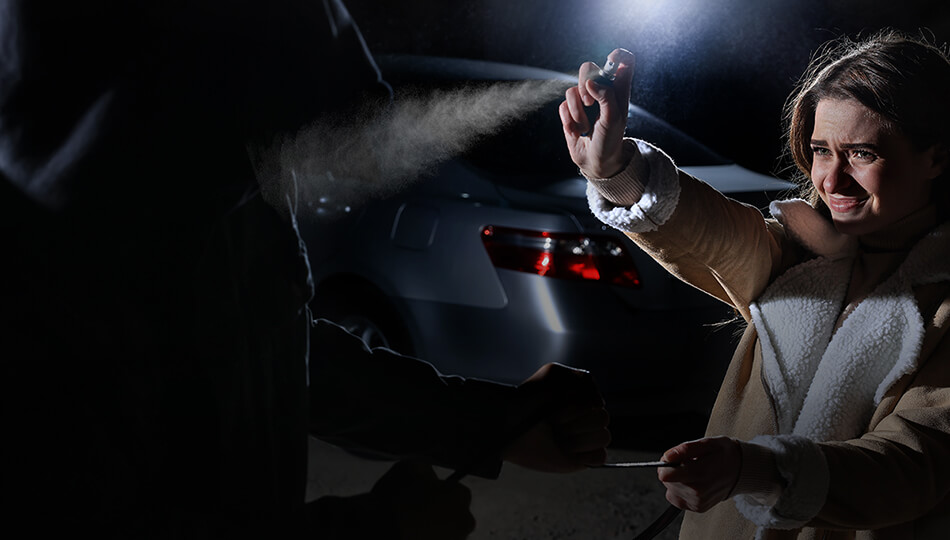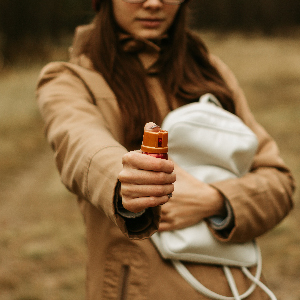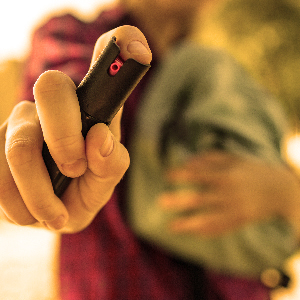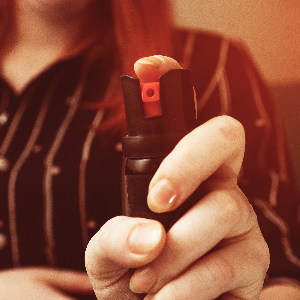
While it’s true that pepper spray, also called OC (Oleoresin Capsicum) spray, is an incredibly popular self-defense tool, it’s not the one-size-fits-all answer that many see it as. Police officers, security guards, and private citizens interested in self-defense have all utilized pepper spray effectively inside of self-defenseincidents to prevent falling victim to violent crime. In fact, pepper spray is so popular and socially accepted that in most states you can find pepper spray in the checkout line of your local hardware or big box store, right alongside the other products they sell. But there’s an important question to ask: Does the popularity of pepper spray lead to people ignoring the potential issues that could come from having it or using it?
Being able to legally obtain pepper spray isn’t always as uncomplicated as grabbing whichever self-defense chemical spray or tear gas weapon you prefer in the checkout line at your local store. Even something as simple as adding pepper spray to your shopping cart at an online business specializing in defense spraysand paying for the shipping to your property could land you in trouble with the police and possibly see you convicted of a crime, depending on the pepper spray laws of your jurisdiction.
Just because many police, security professionals, and private citizens choose to have pepper spray doesn’t mean there aren’t things that need to be considered before incorporating pepper spray into your self-defenseplans. It’s important to understand that while in the eyes of the law a less-lethal tool like pepper spray might not be seen as capable of causing great bodily harm, it’s almost certain to be seen as something that causes bodily harm. This means that you cannot simply pepper-spray a criminal or someone you suspect is about to commit a crime without meeting the legal criteria for using force.
It is unlikely that someone could plug “laws, pepper spray” into their search engine of choice and find everything they need to know regarding when deploying pepper spray would be appropriate or, more importantly, legal. That’s why consulting with a U.S. LawShield® Independent Program Attorney regarding the laws in your state is an important part of making sure that you meet all the legal requirements associated with pepper spray. Even if in general it is legal for you to have pepper spray, it’s crucial to understand that any self-defense pepper spray you carry for your own defense also makes it possible for you to commit multiple crimes, some of which aren’t always obvious, without ever meaning to.
Can Anyone Possess Pepper Spray?
In all 50 states as well as Washington, D.C. (District of Columbia), anyone who is not otherwise restricted and is at least 18 years of age may have pepper spray products that meet the legal requirements of that state in their possession. There are certain jurisdictions where it is legal for a person under 18 to have pepper spray. The most notable example of this is Washington State, where it is legal for 14-year-olds to possess pepper spray so long as they have permission from their parent or guardian. Some states also have laws making it illegal for anyone with a criminal conviction to have pepper spray in their possession. For state-specific laws regarding who may have pepper spray in their possession, contact your U.S. LawShield Independent Program Attorney.
In addition to who may have pepper spray, you need to keep in mind there are multiple states that have legalrestrictions on the type of sprays that someone may have. States can pass laws that restrict or regulate many things, from the capacity of the pepper spray container to an oleoresin capsicum limit that the pepper spray formula cannot exceed; a limit or restriction on the other chemicals contained in the spray, such as dyes or tear gas; and even the safety features and labeling of the pepper spray container. It’s important to remember that not all pepper spray products are the same, or legal, depending on the law in your jurisdiction.
See also: How To Use Pepper Spray (But Why You Probably Shouldn’t)
Enjoying this content? Find out how you can get more sent straight to your inbox.
Why Is Pepper Spray Legal in Every State, Including the District of Columbia?
 Compared to the rest of the world, America has relatively robust legal allowances for self-defense. Pepper spray is generally seen by many as something that does not cause lasting injury to those who are exposed to it, though as certain scholarly articles have pointed out, the rate of injury from pepper spray is not zero. It is generally agreed, however, that pepper spray offers a means for people to defend themselves against crime that is much less likely to cause permanent injury than something that fires a projectile or relies on a cutting or impact surface.
Compared to the rest of the world, America has relatively robust legal allowances for self-defense. Pepper spray is generally seen by many as something that does not cause lasting injury to those who are exposed to it, though as certain scholarly articles have pointed out, the rate of injury from pepper spray is not zero. It is generally agreed, however, that pepper spray offers a means for people to defend themselves against crime that is much less likely to cause permanent injury than something that fires a projectile or relies on a cutting or impact surface.
This perception of the relative safety of pepper spray appears to have led to an almost universal acceptance in the United States that pepper spray is a zero-consequence option for people looking to protect themselves. Even places that are traditionally seen as having relatively draconian carry laws, such asCalifornia, New York, and Washington, D.C., make allowances for people to have pepper spray on their person in public in case they are targeted for crime.
Should You Carry Pepper Spray for Self-Defense?
Making the decision to carry pepper spray should only be reached after very careful consideration. Some people who are interested in firearms for self-defense, or who already carry a concealed gun in public, view pepper spray as a silver bullet that will help solve all the issues that a firearm cannot. A good analogy to consider is one of electrical current. It is generally understood that alternating current (AC) electricity is more dangerous than direct current (DC) electricity due to several factors. However, both forms of current can cause major issues, up to and including death. Both firearms and any of the sprays available on the market, whether it’s a specific brand like Mace® pepper spray or one of the generic sprays available, can also cause serious problems for someone if used inappropriately.
This gets us to the main point that people need to consider: While it is true that the answer to the question of “is pepper spray legal” is generally yes, that doesn’t mean pepper spray comes without a level of risk that must be mitigated. Many people understand the potential negative outcomes that can result from misusing a firearm. Very few people pay attention to the ways that pepper sprays can land someone in trouble with thelaw.
Because pepper spray is so socially acceptable, people can sometimes forget to treat pepper spray with the respect it deserves. Living in a pepper spray state with few legal restrictions regarding sprays doesn’t mean that pepper spray will be legal everywhere you go in the state. Many schools, courthouses, and even the TSA ban the possession of pepper spray in certain areas. If you decide to incorporate pepper spray into your daily life, it is still incredibly important to remember that it’s not legal in all places.
Another thing to keep in mind before thinking of any of the sprays available as some sort of “fix” for any encounter with a criminal you might find yourself in: There is a section of the criminal element who has been exposed to pepper spray multiple times. While multiple exposures to pepper spray might not result in a change regarding the physical effects, repeated exposure can certainly lessen the psychological effect of pepper spray on a person. While pepper spray can be effective, it’s important to remember that the people most likely to commit a crime against us are also the people most likely to have already had an experience with pepper spray.
The availability of a wide range of tools for personal protection is a good thing. Just make sure that before you decide to incorporate any weapon into your daily life, you educate yourself regarding the laws pertaining to that tool. Pepper spray is not something you can throw into your pocket and just forget about until the day you need it. Also, depending on your jurisdiction, there may be some not-so-obvious ways that you can land yourself in trouble with pepper spray. As always, contact your U.S. LawShield Independent Program Attorney for any questions you have regarding weapon laws in your jurisdiction.
Pepper Spray Self-Defense FAQ’s
Your Protection Starts Here!
The information provided in this publication is intended to provide general information to individuals and is not legal advice. The information included in this publication may not be quoted or referred to in any other publication without the prior written consent of U.S. LawShield, to be given or withheld at our discretion. The information is not a substitute for, and does not replace the advice or representation of a licensed attorney. We strive to ensure the information included in this publication is accurate and current, however, no claim is made to the accuracy of the information and we are not responsible for any consequences that may result from the use of information in this publication. The use of this publication does not create an attorney-client relationship between U.S. LawShield, any independent program attorney, and any individual.




Are legaly visiting tourist allowed to possess defence sprays